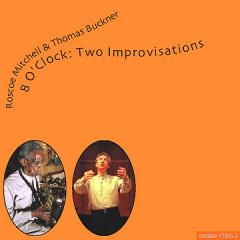ROSCOE MITCHELL & THOMAS BUCKNER / 8 O'Clock: Two Improvisations
Thomas Buckner (voice); Roscoe Mitchell (soprano saxophone, alto saxophone, percussion, flute)
The full spectrum voice of baritone Thomas Buckner has been heard for more than two decades in questing improvisations alongside multi-instrumentalist Roscoe Mitchell. This recording documents a further stage in the duo's ongoing research. Mitchell plays flute and percussion as well as alto and soprano saxophones; Buckner couples evident formal training with freedom to roam. Individual sounds and occasional phrases are placed scrupulously within the field of silence. Relationships among the sounds become apparent with time; patterns emerge and dissolve. (Julian Cowley)
TRACK LIST
Improvisation 1:
VPF (7:41)
VSP (11:10)
VS (8:38)
VFPSA (17:18)
Improvisation 2:
VAP (12:57)
VPA (7:38)
REVIEWS
François Couture, All-Music Guide
Baritone Thomas Buckner and saxophonist Roscoe Mitchell have been playing together for many years. The former’s record label, Mutable Music, reissued early in 2001 the two Space LPs they recorded during the early 1980s with Gerald Oshita. It was only fitting that, after this nostalgic step, a new recording would follow to re-inscribe their collaboration in present times. 8 O’Clock: Two Improvisations was recorded in a studio, a December evening in 2000. As the years passed, Buckner’s voice lost its slightly affected tone and gained depth, roundness, and flexibility. Roscoe Mitchell’s participation in the AACM and the Art Ensemble of Chicago made him a legend. Here he performs on alto and soprano saxophone, but also on flute and percussion. The sound palette is therefore quite wide for a duo. The first improvisation lasts 45 minutes, the second a little over 20 minutes. Both focus on the deep understanding existing between the two improvisers. The music never escalates, it remains calm, delicate, almost restrained at times. The second improv follows an even sparser mood. Listeners will be more used to Mitchell’s horn playing, but the time he spends on small percussion instruments is welcomed: it brings a change of pace and triggers a new set of inflections from Buckner. The performance lacks some involvement but remains enjoyable throughout.

